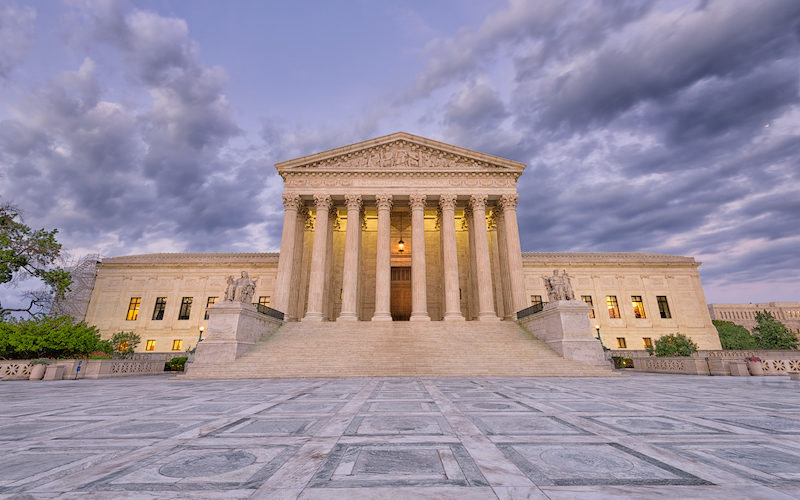
Scholars and practitioners highlight the Court’s most significant regulatory and administrative law decisions.
During its most recent term, the U.S. Supreme Court decided many cases with important and potentially wide-ranging implications for administrative law and regulatory policy. These cases addressed issues as varied as workplace discrimination, immigration policy, environmental policy, the constitutionality of agency leadership structures, and federal preemption.
In light of the COVID-19 pandemic, this term saw the first ever live broadcast of oral arguments as well as a series of delays, cancellations, and accommodations in the Court’s schedule. Yet even amid a global and national health crisis, the Court continued to hear and decide cases, shaping the future of administrative law and regulatory policy.
The Regulatory Review has invited leading scholars and analysts from across the country to assess the Court’s regulatory decisions from its recently concluded term. Among the contributors to this series are: Bernard Bell, Rutgers Law School; Amelia Burnette, Southern Environmental Law Center; Alejandro Camacho, University of California, Irvine School of Law; Cary Coglianese, University of Pennsylvania Law School; Charlton Copeland, University of Miami School of Law; Jon Devine, Natural Resources Defense Council; Katie Eyer, Rutgers Law School; Michael Harper, Boston University; David Henkin, Earthjustice; Cale Jaffe, University of Virginia School of Law; Jaclyn Kelley-Widmer, Cornell Law School; Melissa Kelly, University of California, Irvine School of Law; Stephen Lee, University of California, Irvine School of Law; Ashwin Phatak, Constitutional Accountability Center; Richard J. Pierce, Jr., George Washington University; Rachel Rebouché, Temple University Beasley School of Law; and Richard Revesz, New York University School of Law.
Closing a Concocted Clean Water Act Loophole
July 20, 2020 | Jon Devine, Natural Resources Defense Counsel, and David Henkin, Earthjustice
The Court’s refusal to eviscerate a key safeguard in the Clean Water Act reflects a welcome, and precisely correct, focus on applying the plain text of the law consistent with the U.S. Congress’s clear intent in enacting it.
A Dream Deferred
July 20, 2020 | Jacyln Kelley-Widmer, Cornell Law School
The Supreme Court decision from this term effectively defers action on deferred action, temporarily continuing protection while providing an opening for the government to attempt rescission again.
Revisiting the Constitutionality of Independent Agencies
July 21, 2020 | Bernard W. Bell, Rutgers Law School
When can Congress protect agency heads from at-will removal by, or at the behest of, the President? The majority’s rule in Seila Law v. CFPB sets forth a robust limit on Congress’s ability to constrain removal.
Another Explanation of Justice Gorsuch’s Bostock Vote
July 22, 2020 | Charlton C. Copeland, University of Miami School of Law
How did we get a 6-3 vote in favor of LGBTQ rights from arguably the most conservative Supreme Court of the last 100 years? My guess is that Justice Neil Gorsuch’s battle against the Chevron doctrine played an important role.
Federalism and Environmental Advocacy
July 23, 2020 | Cale Jaffe, University of Virginia School of Law
Will state-centric environmentalism have some staying power? Three decisions from the Supreme Court’s latest term—Atlantic Richfield, County of Maui, and Cowpasture River Preservation Association—are beginning to give us some clues.
Clarifying the Default for Anti-Discrimination Statutes
July 27, 2020 | Michael C. Harper, Boston University School of Law
In two decisions this spring, the Supreme Court marked more clearly the path it will tread in determining the role that discriminatory or retaliatory motivation must play to make a particular employment decision or process unlawful.
Why the Equality Act Remains Important to LGBTQ Equality
July 27, 2020 | Katie Eyer, Rutgers Law School
Bostock was a major victory, both for LGBTQ rights and for the rule of law. But for those who care about LGBTQ equality, Bostock should not cause us to lose sight of the need to continue to push for legislative reforms.
The Shape of Water After County of Maui v. Hawaii Wildlife Fund
July 28, 2020 | Alejandro E. Camacho and Melissa Kelly, University of California, Irvine School of Law
The Court fashioned its own functional equivalent test, articulating several potentially relevant factors to consider when determining whether a Clean Water Act permit is required. But exactly how far the protections afforded by the Clean Water Act will reach remains uncertain.
DACA and the Limits of Good Governance
July 29, 2020 | Stephen Lee, University of California, Irvine School of Law
Courts can curb the worst of the federal government’s tendencies by ensuring that policies are rational and reasonable—but this does not offer a meaningful life to hundreds of thousands of Dreamers waiting for a firm answer to the question of whether they can plan for tomorrow.
Reason Trumps Pretext
July 30, 2020 | Richard J. Pierce, Jr., George Washington University Law School
Over the past two years, the Supreme Court has applied an approach to judicial review of government actions that has reinvigorated, strengthened, and broadened the scope of the duty to engage in reasoned decision-making.
Consumers Win Assurance of Important Protection From Securities Fraud
August 3, 2020 | Ashwin Phatak, Constitutional Accountability Center
In Liu v. SEC, the Supreme Court delivered an important win for consumers, ensuring that the U.S. Securities and Exchange Commission can enforce securities laws and reimburse victims of fraud and other securities violations.
Court Weighs in on Pipeline Crossing Appalachian Trail
August 3, 2020 | Amelia Burnette, Southern Environmental Law Center
In United States Forest Service v. Cowpasture, the Supreme Court held that the U.S. Forest Service could authorize the Atlantic Coast Pipeline, a now-cancelled $8 billion pipeline project, to cross the Appalachian Trail in the George Washington National Forest.
Abortion Restrictions After June Medical Services
August 4, 2020 | Rachel Rebouché, Temple University Beasley School of Law
After issuing its decision in June Medical Services LLC v. Russo, the Supreme Court ordered the U.S. Court of Appeals for the Seventh Circuit to reconsider two abortion restrictions enacted in Indiana. What does June Medical mean for those restrictions?
Toward a “Unitary Executive” Vision of Article II?
August 5, 2020 | Richard L. Revesz, New York University School of Law
In striking down the for-cause provision governing the removal of the Consumer Financial Protection Bureau’s single director, the Court implausibly distinguished this case from settled precedent, keeping an important building block of the administrative state in place for now.
Dissing the Supreme Court
August 10, 2020 | Cary Coglianese, University of Pennsylvania Law School
A remarkable, yet disturbing, aspect of the Supreme Court’s past term had nothing to do with the Court itself. Rather than responsibly accepting adverse rulings by the Court, the Trump Administration resorted to derisive dismissals of the Court’s authority, threatening to undermine public legitimacy in the rule of law.



